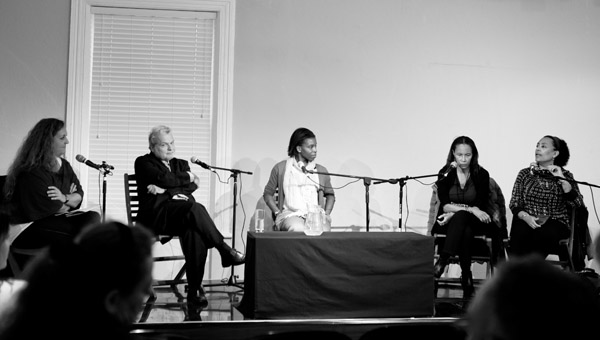Etonnants Voyageurs: Place, Space and Writing, 22 September 2012, Fugard First
DANSON KAHYANA

Clockwise from top left: Nédim Gürsel, Yanick Lahens, Veronique Tadjo and Noo Saro-Wiwa
This event, which in English means “Amazing/astonishing Travellers”, featured four writers – Yanick Lahens (Haitian novelist, short story writer and literary critic), Veronique Tadjo (novelist, academic and author of children's books born in France to an Ivorian father and a French mother), Nédim Gürsel (Turkish novelist, short story writer, and essayist), and Noo Saro-Wiwa (travel writer and daughter of Ken Saro-Wiwa, the Nigerian writer, human rights activist and environmentalist who was executed by departed Nigerian dictator-president, General Sani Abacha, in 1995).
Three key issues were raised in this session: the impact of place of residence on the writers’ subject matter; the writers’ take on multiculturalism and global citizenship; and the writers’ choice of French or English.
Veronique and Nédim revealed that even when they reside in a different country (South Africa for the former and France for the latter), they find it easy to set their works in their home countries – Ivory Coast and Turkey respectively. This does not mean they cannot set their books elsewhere – Veronique has set one of her novels, In the Shadow of Imana, in Rwanda.

Chair, Nédim Gürsel (second from left), Noo Saro-Wiwa, Yanick Lahens and Veronique Tadjo
The question of multiculturalism and global citizenship arose because all the writers, except Yanick, are not living in what one would consider their native countries: Noo Saro-Wiwa lives in the United Kingdom instead of Nigeria where she was born; Veronique lives in South Africa instead of France (where her mother was born) or Ivory Coast (where her father was born), and Nédim lives in France instead of Turkey. The writers dismissed the concept of global citizenship as a privilege of a few people who are able to travel wherever and whenever they wish.
On the language question, the writers said they were more or less at home with French or English. For Veronique and Noo, who are not proficient enough in their African languages, French and English, respectively, are like mother tongues. For Nédim, Turkish is the language he uses for fiction while French is the language he uses for essays and newspaper articles. “If I were to consider Turkish my legitimate wife, I would consider French my mistress,” he said, sending the audience into gales of laughter.
 SLiPStellenbosch Literary Project
SLiPStellenbosch Literary Project